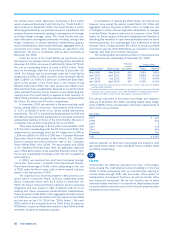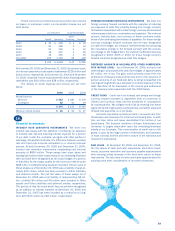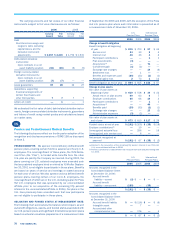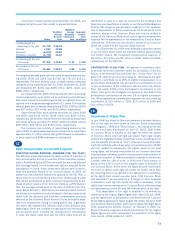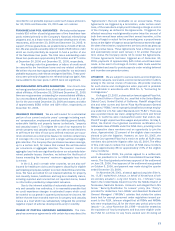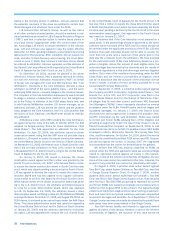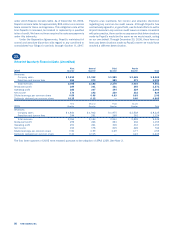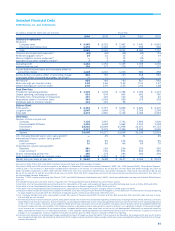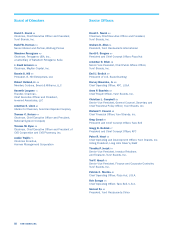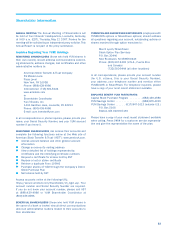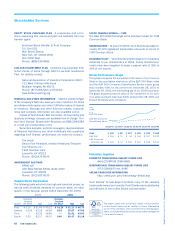Pizza Hut 2006 Annual Report Download - page 73
Download and view the complete annual report
Please find page 73 of the 2006 Pizza Hut annual report below. You can navigate through the pages in the report by either clicking on the pages listed below, or by using the keyword search tool below to find specific information within the annual report.
78 YUM! BRANDS, INC.
weeks in the recovery period. In addition, Johnson claimed that
the potential members of the class are entitled to certain liqui-
dated damages and attorneys’ fees under the FLSA.
LJS believed that Johnson’s claims, as well as the claims
of all other similarly situated parties, should be resolved in indi-
vidual arbitrations pursuant to LJS’s Dispute Resolution Program
(“DRP”), and that a collective action to resolve these claims in
court was clearly inappropriate under the current state of the
law. Accordingly, LJS moved to compel arbitration in the Johnson
case. LJS and Johnson also agreed to stay the action effective
December 17, 2001, pending mediation, and entered into a tolling
agreement for that purpose. After mediation did not resolve the
case, and after limited discovery and a hearing, the Court deter-
mined on June 7, 2004, that Johnson’s individual claims should
be referred to arbitration. Johnson appealed, and the decision of
the District Court was affirmed in all respects by the United States
Court of Appeals for the Sixth Circuit on July 5, 2005.
On December 19, 2003, counsel for plaintiff in the above
referenced Johnson lawsuit, filed a separate demand for arbitra-
tion with the American Arbitration Association (“AAA”) on behalf
of former LJS managers Erin Cole and Nick Kaufman (the “Cole
Arbitration”). Claimants in the Cole Arbitration demand a class
arbitration on behalf of the same putative class — and the same
underlying FLSA claims — as were alleged in the Johnson lawsuit.
The complaint in the Cole Arbitration subsequently was amended
to allege a practice of deductions (distinct from the allegations
as to the Policy) in violation of the FLSA salary basis test, and
to add Victoria McWhorter, another LJS former manager, as an
additional claimant. LJS has denied the claims and the putative
class alleged in the Cole Arbitration, and it is LJS’s position that
the claims of Cole, Kaufman, and McWhorter should be individu-
ally arbitrated.
Arbitrations under LJS’s DRP, including the Cole Arbitration,
are governed by the rules of the AAA. In October 2003, the AAA
adopted its Supplementary Rules for Class Arbitrations (“AAA
Class Rules”). The AAA appointed an arbitrator for the Cole
Arbitration. On June 15, 2004, the arbitrator issued a clause
construction award, ruling that the DRP does not preclude class
arbitration. LJS moved to vacate the clause construction award in
the United States District Court for the District of South Carolina.
On September 15, 2005, the federal court in South Carolina ruled
that it did not have jurisdiction to hear LJS’s motion to vacate.
LJS appealed the U.S. District Court’s ruling to the United States
Court of Appeals for the Fourth Circuit.
On January 5, 2007, LJS moved to dismiss the clause
construction award appeal and that motion was granted by the
Fourth Circuit on January 10, 2007. LJS had also filed a motion
to vacate the clause construction award in South Carolina state
court, which was stayed pending a decision by the Fourth Circuit.
LJS has agreed to dismiss the motion to vacate the clause con-
struction award and has also agreed not to oppose claimants’
cross-motion to confirm that award by the South Carolina court.
While judicial review of the clause construction award was pend-
ing in the U.S. District Court, the arbitrator permitted claimants
to move for a class determination award, which was opposed
by LJS. On September 19, 2005, the arbitrator issued a class
determination award, certifying a class of LJS’s RGMs and ARGMs
employed between December 17, 1998, and August 22, 2004, on
FLSA claims, to proceed on an opt-out basis under the AAA Class
Rules. That class determination award was upheld on appeal by
the United States District Court for the District of South Carolina
on January 20, 2006, and the arbitrator declined to reconsider
the award. LJS has appealed the ruling of the U.S. District Court
to the United States Court of Appeals for the Fourth Circuit. LJS
has also filed a motion to vacate the class determination award
in South Carolina state court, which has been stayed by the South
Carolina court pending a decision by the Fourth Circuit in the class
determination award appeal. Oral argument in the Fourth Circuit
was heard on January 31, 2007.
LJS believes that if the Cole Arbitration must proceed on a
class basis, (i) the proceedings should be governed by the opt-in
collective action structure of the FLSA, and (ii) a class should not
be certified under the applicable provisions of the FLSA. LJS also
believes that each individual should not be able to recover for
more than two years (and a maximum three years) prior to the
date they file a consent to join the arbitration. We have provided
for the estimated costs of the Cole Arbitration, based on a pro-
jection of eligible claims, the amount of each eligible claim, the
estimated legal fees incurred by the claimants and the results of
settlement negotiations in this and other wage and hour litigation
matters. But in view of the novelties of proceeding under the AAA
Class Rules and the inherent uncertainties of litigation, there
can be no assurance that the outcome of the arbitration will not
result in losses in excess of those currently provided for in our
Consolidated Financial Statements.
On September 2, 2005, a collective action lawsuit against
the Company and KFC Corporation, originally styled Parler v. Yum
Brands, Inc., d/b/a KFC, and KFC Corporation, was filed in the
United States District Court for the District of Minnesota. Plain-
tiff alleges that he and other current and former KFC Assistant
Unit Managers (“AUMs”) were improperly classified as exempt
employees under the FLSA. Plaintiff seeks overtime wages and
liquidated damages. On January 17, 2006, the District Court
dismissed the claims against the Company with prejudice, leav-
ing KFC Corporation as the sole defendant. Notice was mailed
to current and former AUMs advising them of the litigation and
providing an opportunity to join the case if they choose to do so.
Plaintiff amended the complaint on September 8, 2006, to add
related state law claims on behalf of a putative class of KFC AUMs
employed in Illinois, Minnesota, Nevada, New Jersey, New York,
Ohio, and Pennsylvania. On October 24, 2006, plaintiff moved to
decertify the conditionally certified FLSA action, and KFC Corpora-
tion did not oppose the motion. In January, 2007 the magistrate
recommended that the motion for decertification be granted.
We believe that KFC has properly classified its AUMs as
exempt under the FLSA and applicable state law, and accordingly
intend to vigorously defend against all claims in this lawsuit.
However, in view of the inherent uncertainties of litigation, the out-
come of this case cannot be predicted at this time. Likewise, the
amount of any potential loss cannot be reasonably estimated.
On August 4, 2006, a putative class action lawsuit against
Taco Bell Corp. styled Rajeev Chhibber vs. Taco Bell Corp. was filed
in Orange County Superior Court. On August 7, 2006, another
putative class action lawsuit styled Marina Puchalski v. Taco Bell
Corp. was filed in San Diego County Superior Court. Both lawsuits
were filed by a Taco Bell RGM purporting to represent all current
and former RGMs who worked at corporate-owned restaurants in
California from August 2002 to the present. The lawsuits allege
violations of California’s wage and hour laws involving unpaid over-
time and meal and rest period violations and seek unspecified
amounts in damages and penalties. As of September 7, 2006, the
Orange County case was voluntarily dismissed by the plaintiff and
both cases have been consolidated in San Diego County.
Taco Bell denies liability and intends to vigorously defend
against all claims in this lawsuit. However, in view of the inherent
uncertainties of litigation, the outcome of this case cannot be


